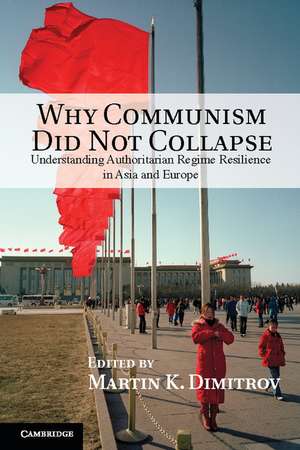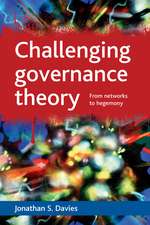Why Communism Did Not Collapse: Understanding Authoritarian Regime Resilience in Asia and Europe
Editat de Martin K. Dimitroven Limba Engleză Paperback – 5 aug 2013
| Toate formatele și edițiile | Preț | Express |
|---|---|---|
| Paperback (1) | 284.49 lei 6-8 săpt. | |
| Cambridge University Press – 5 aug 2013 | 284.49 lei 6-8 săpt. | |
| Hardback (1) | 742.17 lei 6-8 săpt. | |
| Cambridge University Press – 30 iul 2013 | 742.17 lei 6-8 săpt. |
Preț: 284.49 lei
Nou
Puncte Express: 427
Preț estimativ în valută:
54.44€ • 56.98$ • 45.31£
54.44€ • 56.98$ • 45.31£
Carte tipărită la comandă
Livrare economică 31 martie-14 aprilie
Preluare comenzi: 021 569.72.76
Specificații
ISBN-13: 9781107651135
ISBN-10: 1107651131
Pagini: 390
Ilustrații: 6 b/w illus. 7 tables
Dimensiuni: 152 x 229 x 22 mm
Greutate: 0.52 kg
Ediția:New.
Editura: Cambridge University Press
Colecția Cambridge University Press
Locul publicării:New York, United States
ISBN-10: 1107651131
Pagini: 390
Ilustrații: 6 b/w illus. 7 tables
Dimensiuni: 152 x 229 x 22 mm
Greutate: 0.52 kg
Ediția:New.
Editura: Cambridge University Press
Colecția Cambridge University Press
Locul publicării:New York, United States
Cuprins
Part I. Reform and Resilience: 1. Understanding communist collapse and resilience Martin K. Dimitrov; 2. Resilience and collapse in China and the Soviet Union Thomas Bernstein; Part II. Ideology and Resilience: 3. Ideological erosion and the breakdown of communist regimes Vladimir Tismaneanu; 4. Ideological introversion and regime survival: North Korea's 'our-style socialism' Charles Armstrong; Part III. Contagion and Resilience: 5. Bringing down dictators: waves of democratic change in communist and postcommunist Europe and Eurasia Valerie J. Bunce and Sharon L. Wolchik; 6. The dynamics of contagion in the Soviet Bloc and the impact on regime survival Mark Kramer; Part IV. Inclusion and Resilience: 7. Authoritarian survival, resilience, and the selectorate theory Mary Gallagher and Jonathan Hanson; 8. Cause or consequence? Private-sector development and communist resilience in China Kellee S. Tsai; Part V. Accountability and Resilience: 9. Vietnam through Chinese eyes: divergent accountability in single-party regimes Regina Abrami, Edmund Malesky and Yu Zheng; 10. Vertical accountability in communist regimes: the role of citizen complaints in Bulgaria and China Martin K. Dimitrov; 11. Conclusion: whither communist regime resilience Martin K. Dimitrov.
Recenzii
“Is the difference smarter leaders? Luckier circumstances? Deeper ideological beliefs? Structural flaws or assets? Political strategies of limited opening versus inopportune repression? Differential impact of the international system? This splendid team of authors thoughtfully sheds comparative light on the opaque processes of the collapse or survival of communist regimes.” – Jorge I. Domínguez, Harvard University
“This is a terrific book. By using paired comparisons of communist regimes that collapsed in 1989–1991 and others that managed to survive, Dimitrov and his fellow authors provoke us to think in new ways about the durability of these types of regimes over time. In this way, the volume moves us beyond clichéd discussions about the trials of communism and challenges us to think systematically about what determines regime resilience and failure. I have no doubt that this book will provide important insights for future studies about the entire communist era.” – A. James McAdams, University of Notre Dame
“Communism has a past, but does it have a future? In this fascinating study, Martin Dimitrov has assembled an impressive set of leading international scholars to examine the staying power of the communist party-states that weathered the 1989–1991 denouement of the Soviet Union and its client states. The result is a theoretically insightful and empirically rich study in comparative politics and Leninist style systems. The volume leaves the reader with the sense that we have not seen the end of collapsing communist-type regimes.” – David Shambaugh, The George Washington University and The Brookings Institution
“This is a terrific book. By using paired comparisons of communist regimes that collapsed in 1989–1991 and others that managed to survive, Dimitrov and his fellow authors provoke us to think in new ways about the durability of these types of regimes over time. In this way, the volume moves us beyond clichéd discussions about the trials of communism and challenges us to think systematically about what determines regime resilience and failure. I have no doubt that this book will provide important insights for future studies about the entire communist era.” – A. James McAdams, University of Notre Dame
“Communism has a past, but does it have a future? In this fascinating study, Martin Dimitrov has assembled an impressive set of leading international scholars to examine the staying power of the communist party-states that weathered the 1989–1991 denouement of the Soviet Union and its client states. The result is a theoretically insightful and empirically rich study in comparative politics and Leninist style systems. The volume leaves the reader with the sense that we have not seen the end of collapsing communist-type regimes.” – David Shambaugh, The George Washington University and The Brookings Institution
Descriere
Addresses the durability of communist autocracies in Eastern Europe and Asia, the longest-lasting type of non-democratic regime to emerge after World War I.













